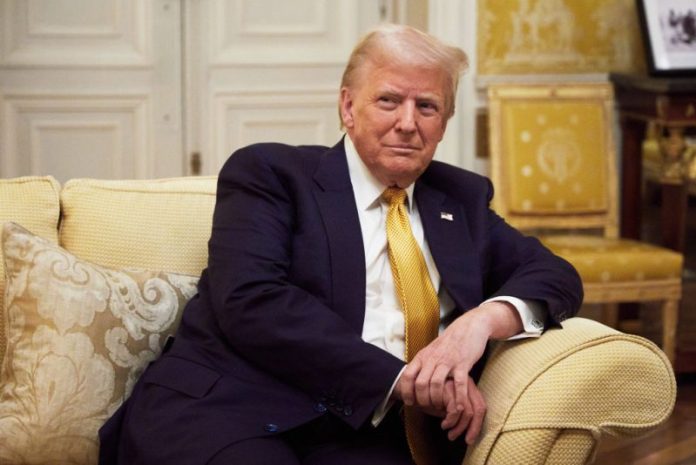
OAN Commentary by: Theodore R. Malloch
Friday, December 20, 2024
Early on the freezing cold morning of January 10, 1776, in Philadelphia, a forty-seven-page booklet was published that would go on to change American and indeed world history. It was the watershed moment in the American Revolution. The publication was called Common Sense, and its author was Thomas Paine. The arguments contained in the petite volume galvanized opposition to the Crown and catalyzed the political movement to independence.
The ideas expressed ushered in a new era of freedom in America and around the world. The 2024 election harkens us back to that founding moment and its progenitor, one Donald J. Trump, ushers in a much-needed return of the same common sense.
Paine had been born in Britain and had only immigrated to America in 1774 at the suggestion of Benjamin Franklin. Writing for the Pennsylvania Magazine under the pseudonyms of Atlanticus, Aesop, and Vox Populi, he lashed out at the folly and wrongs of British rule. His common-sense opus, written in language every common person could understand, had instant and dramatic effect. Striking a chord with colonist conscience, it was rapidly translated into many languages, reprinted thousands of times over, and circulated widely. It did nothing less than convince Americans who were undecided on the issue of independence that they should unite and separate.
Paine considered the content of his pamphlet to be a plain truth (which was, at first, his working title), clear to all right-thinking, rational persons. He had borrowed the phrase from its earlier use in England (as early as the fourteenth century), where it was considered a sense very much like our other senses. They were called the “five wits,” and the “common” sense united them into a useful whole.
Like that powerful expression of American consciousness, today with the coming of Trump 2.0, we see another jolt of common sense—this time in politics, foreign policy, and economics. The country sorely needs it to restore our faith in sovereignty, in the market and wealth creation, and also to give common people, regular men and women in America and around the world, a prudent voice for creating a better future.
Unfortunately, it is often said that common sense is not as common as it ought to be. Possibly one of the best recent spokespersons for common sense was Ronald Reagan. In his farewell address, the fortieth president defined his time in office as “a rediscovery of our values and our common sense.” Actually, from the very start of his career, Reagan dedicated his tenure to his belief in the idea that society “could be operated efficiently by using the same common sense practiced in our everyday life, in our homes, in business and private affairs.”
Today, some four decades later, responsible, purposeful leaders with Trump as the lead, are taking up this mantle and again laying claim to the phrase “common sense.” What exactly does this mean, and how does it work? What truths do we hold as self-evident in a common-sense framework, and what are the benefits—to leaders, communities, and most critically to citizens themselves?
In the field of economics, common-sense behavior has been seen as saving more money when one is faced with an uncertain future; it’s part of “risk aversion.” The so-called precautionary saving motive is one of many faulty principles of the dismal science. In economics’ cousin, accounting, prudence is a fundamental concept. It determines the time at which revenue can be recognized, which is not an unimportant or inconsequential event. Lawyers also still abide by the “prudent man rule,” a nearly two-hundred-year-old judgement method appealing to — common sense. Some governments have even established prudential conduct authorities, intended to guide fiscal choices in a better direction after financial crises.
Arguably among the most dominant organizations on the planet, the Church, has insisted on maintaining the virtue of prudence in all ventures, making it part of its standard for belief and practice, the Catechism: “Prudence is the virtue that disposes practical reason to discern our true good in every circumstance and to choose the right means of achieving it.” It goes on to conclude with some sound advice: “The prudent man looks where he is going.”
If prudent behavior is right reason in action—or as I define it, the natural intelligence that is available to all rational people—then why has it been mostly abandoned, forfeited in more recent times and nearly totally forgotten by our post-modern culture and governments? (That is, except for Reagan, and now, President Trump). It behooves us to trace the history of common sense’s demise, for in so doing, we may discover avenues for its resurrection.
Bringing Common Sense Back
We can conclude that any resurrection of the notion of common sense will require a rejection of the modernist and leftist approach—and this will have profound consequences. Our narrowed perspective has turned prudence into a utility or even worse, some kind of cleverness possessed only by the elite few and so-called gifted. But it is in fact the virtue par excellence for guiding us into an uncertain and ever riskier future. This will demand self-attention but also thoughtful social interaction in our modern setting. It means putting an end to all the woke liberal nonsense and going back to basics, values every person possess.
This is because while prudence (an indispensable core of common sense) may start with the individual, it culminates in our actions together. Businesses in particular must implement sound management as their “core competency” for acting in responsible and humane ways. In this sense, both government and business must in the first instance appeal to common sense and to experience—not to some ideology.
As for the economists, they must enter the future with an honest assessment of the professed neutrality of their field. When intrinsic things like spirituality, values, ideas, human life, and aesthetic phenomena are monetized, they are by definition being evaluated and ranked, usually far under financial gain, which holds the highest place. This is far from “neutral,” and to insist so is an illusion.
What we need to achieve is a leap forward into the past, a time when philosophers like Adam Smith, considered economics part and parcel of the common good, a moral sentiment, not an adversary to it.
But the winds of change are blowing. Political leaders, including most prominently Donald Trump, see that their decisions always involve qualitative acts of judgment based on common sense for the common good.
In truth, the workings of the economy are not as mysterious as we make them out to be. “The economy” is no more and no less than what “we, the people” do or don’t do in terms of our transactions. There is not one rigid set of economic laws that applies everywhere and at all times. Rather, the behavior of individual economic agents changes the “laws” that generalize that very behavior. Hence, there is no other way to find out whether the best forms of doing business hurt or help the bottom line or the polity than to try them out by using plain old common sense. And here then is the good news. Studies have shown that such sustained practices do not hurt competitiveness at all; they have been found to be more than slightly positive, more profitable, more generous, more beneficent.
The possibility for both financial viability and good government exists. Consequently, there is a moral responsibility to use it well. Recovering common sense in government and business is a leadership journey that builds on competence, grows with authority, is aligned with other virtues, and is grounded in the traits of common sense.
We need to acknowledge that Trump is the founder of the third American revolution, after Washington and the original founders, and Lincoln at the time of the Civil War. He is putting common sense back to work and restoring our national prowess and its profound greatness.
THEODORE ROOSEVELT MALLOCH is the author among 18 other books and hundreds of articles and media appearances of Common Sense Business.


